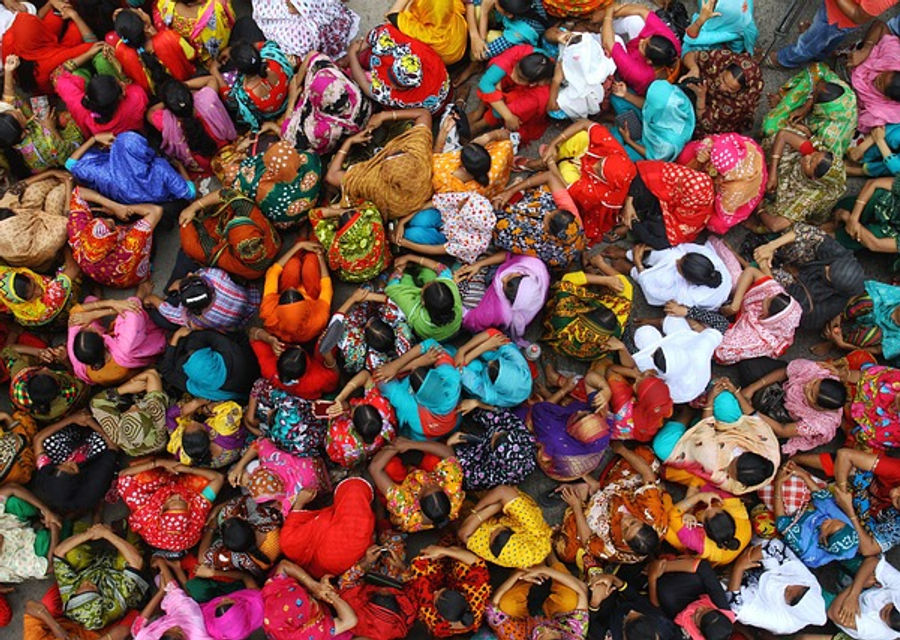The Emergence of a New Bangladesh: Challenges and Progress
- THE MAG POST

- Aug 10, 2025
- 5 min read

The recent developments in Bangladesh highlight the emergence of a new political landscape following the resignation of Prime Minister Sheikh Hasina. As Bangladesh moves toward forming a new society, citizens are filled with aspirations and confusion alike. This transition offers promise but also unveils a multitude of challenges. While celebrating liberation, there is an urgent need to address deep-rooted issues surrounding gender equality and political inclusivity within the new Bangladesh framework.
The recent political turmoil in Bangladesh has brought forth significant changes, especially following the dramatic resignation of Prime Minister Sheikh Hasina. This situation marks a pivotal moment in the nation’s journey towards a democratic framework needing deep analysis. The people of Bangladesh, amidst joyous celebrations marking the end of Hasina's rule, are witnessing a fragile transition as they strive for a new Bangladesh. Unity among activists, various political parties, and interim government leaders showcases a hopeful yet complex scenario for national rebuilding.
Celebrations and Challenges in the New Bangladesh
As thousands gathered in Dhaka to celebrate what has been labeled as a "second liberation" for Bangladesh, the atmosphere was filled with both joy and uncertainty. People waved national flags while attending rallies, concerts, and prayer services aimed at igniting a sense of national pride. However, these festivities masked the realities on the ground, where rising instances of violence, including lynching and mob assaults, threaten to derail the positive momentum. Rights groups are concerned that these actions indicate a resurgence of extremist sentiments that were suppressed during Hasina's tenure.
The interim government, led by Muhammad Yunus, faces the daunting task of managing joy and mixed sentiments as it strives to create an inclusive platform for all Bangladeshis. Activists hope that comprehensive programs, particularly those focusing on women’s rights and social reforms, will create pathways toward sustainable development. Yet, critics remain skeptical, warning that the deeply ingrained misogyny and societal hierarchies have yet to be dismantled effectively.
Political analysts are paying close attention to how the interim government will handle ongoing tensions, particularly the backlash from conservative factions against proposed reforms that seek to level the playing field for women. This pushback highlights the complexity at play within Bangladesh's socio-political environment. The protests organized by hardliners signify a significant societal schism that could hinder the progress envisioned by various reform movements.
Despite the challenges, there are signs of progress. The new government has stabilized the economy, allaying fears of collapse, and managed to maintain robust foreign exchange reserves while keeping food prices from skyrocketing. However, they must address underlying social issues and establish a comprehensive strategy to foster harmony and inclusivity within the nation, ensuring that the sacrifices from the past year lead to meaningful change.
The Role of Women’s Rights in Building a New Bangladesh
The new Bangladesh government has increasingly recognized women’s rights as central to achieving social justice and equality. The Women's Affairs Reform Commission submitted a comprehensive report advocating for gender equality and proposing critical legislative changes. These recommendations include measures for women's inheritance rights and criminalizing marital rape. Such initiatives demonstrate a promising step towards gender equity within the nation, aligning with global standards of human rights.
However, the reception of these proposals has been mixed, with thousands of Islamist hardliners protesting the perceived anti-Islamic nature of the women's rights initiatives. This response reveals a widespread tension surrounding cultural and religious interpretations of gender roles, further complicating the already nuanced discourse on social progress in the country. Many wonder if the government can effectively mediate these divergent views to forge a more inclusive society.
Activists face the daunting challenge of advocating for essential rights while counteracting the influence of groups like Hefazat-e-Islam, which opposes gender-based reforms. These counter-reactions underscore the ongoing struggle for women’s rights in Bangladesh, where traditional beliefs often clash with progressive ideas. Balancing these dynamics effectively is crucial for the interim government as they strive to create a foundation for future generations.
Despite the resistance from conservative factions, there remains hope among activists that continued pressure and advocacy will lead to incremental changes. The evolving landscape of women's rights in Bangladesh is indicative of broader cultural shifts that could slowly change societal attitudes. Whether this hope translates into actionable reforms largely hinges on the government's responsiveness and commitment to fostering inclusive governance.
Internal and External Challenges Facing Bangladesh
The political landscape in Bangladesh continues to evolve with various internal and external challenges. The interim government faces scrutiny over how it treats former governmental figures while dealing with the residual anger toward the previous administration. Ensuring fair treatment while promoting accountability will be a delicate balancing act that will either bolster or undermine the government's credibility.
External relationships, particularly with neighboring India, are also in a precarious position as tensions flare over trade restrictions and diplomatic negotiations. Managing these international relationships is vital for maintaining stability, especially as the economy strives to recover and grow. Investors and foreign governments will be closely watching how Bangladesh navigates these challenges, which could have lasting impacts on economic viability.
Furthermore, the rise in mob violence and reports of extra-judicial killings pose significant threats to the future of Bangladesh. Critics argue that without thorough investigations and accountability structures, these practices risk perpetuating the very cycles of violence that the nation aims to escape. Addressing these issues will require not just a mindset change but robust legal reforms to ensure a fair judicial process.
Apprehensions about the growing influence of hardline groups underscore the complex cultural dynamics within the nation. Critics warn that these factions may gain traction if not adequately countered by an inclusive political dialogue. Building a new Bangladesh will require embracing diversity and inclusivity while ensuring that all voices are heard and represented in the political arena.
Looking Ahead: Hope for a Democratic Future
As Bangladesh stands at a crossroads, key players are preparing for what may lie ahead in this transformative period. The upcoming elections will be crucial in determining the future political landscape and ensuring that the sacrifices made during the uprising lead to tangible outcomes. Activists advocate for inclusive participation from all groups, including those previously excluded by the Awami League.
The next six months will be pivotal for establishing democratic norms and practices that protect against authoritarian influences. Vigilant monitoring by civil society organizations and the international community will be essential to ensure progress is monitored and rights are upheld. Without checks and balances, the new government risks replicating the injustices of the past.
The ongoing dialogue around rights, equality, and democracy signifies an awakening among the Bangladeshi populace. People are increasingly articulating their demands for accountability and transparency, indicative of a burgeoning civil society willing to stand up for their rights. If successful, these movements could plant the seeds for a new political culture characterized by respect and inclusivity.
While significant challenges remain, such as handling hardline resistance and restoring faith in governmental systems, there is potential for a brighter future in Bangladesh. Collaborations between progressive groups, activists, and the government could yield effective reforms if channeled productively. Creating a robust framework for discussion and action will foster a more inclusive and equitable society, shaping Bangladesh for generations to come.
From our network :






















































Comments